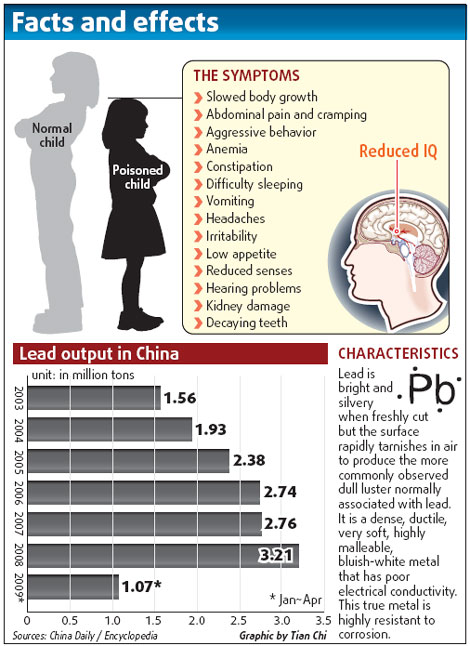A panel of experts from the Ministry of Environmental Protection (MEP) and Ministry of Health were sent to head investigations into the poisonings in Wugang and Kunming. A full report is expected this week but on Aug 28 the panel said it had found "no direct link" between the excessive lead levels and industrial production.
However, all reports of the illness were from residential areas near smelting plants, while experts have warned the scandals underline the flaws in environmental protection and civil affairs bureaus.
Many also blasted local authorities for putting economic development before public health.

The Dongling Lead and Zinc Smelting company opened in the town of Changqing in Fengxiang in 2004 and contributes 17 percent of the county's gross domestic product (GDP). A government probe last month identified the plant as the cause of the worst of the recent outbreaks, in which 851 children were found to be sick and 157 were hospitalized.
"The poisoning cases come as no surprise," said Jin Yinlong, director-general of the National Institute for Environment and Health under the nation's Center for Disease Control. "There are many heavy metal industries and the public has been widely exposed to lead through industrial waste.
"Sources of lead poisoning are everywhere in China, but the biggest effect on people's health is the low standard of controls for industrial emissions."
Jacob de Boer, a professor in environmental chemistry and toxicology at the Vrije University in Amsterdam, Holland, agreed and said: "For vulnerable groups like children the level of poisoning is 100 mcg/l. But in developed nations such as the United States and Japan, the standard is 60 mcg/l and 40 mcg/l respectively."
Villagers in Madaokou told China Daily the Dongling plant sits on land that was "acquired by force" from residents in 2003 by the county government.
"They mowed our corn and dismantled our houses without our permission," said villager Ma Shengqin. "We all knew the factory would end up causing pollution but we had to accept the project. We had no choice."
Wang Mingming, director of Fengxiang's publicity department, declined to comment on the claims and said the factory was built before he took office.
"People living close to the sites of proposed industrial projects nearly always have a general idea of the potential risks and hazards they face," said Gu Haibing, professor in public management at the Renmin University of China in Beijing. "But, more often than not, their voices are too weak because they are scattered through several different areas. Villagers usually have to protest to get their voice heard."
Frustrated Fengxiang residents staged a protest outside the Dongling plant before breaking into the plant on Aug 17. Demonstrators in Hengjiang, near Wugang, were also involved in a standoff with officials and police on Aug 8. No one was arrested or injured in either incident.
Li Zhengrong, director of Wenping township, which administers Hengjiang, declined to talk about the standoff and would only say that protesters "need someone to talk for them and that should be deputies to all levels of people's congress".
However, Liu Zhongwu, owner of the Jinglian Manganese Smelting factory, has been a deputy to the people's congress in Wugang and nearby Shangyang since 2007, but reportedly went on the run on Aug 13 when city officials arrived to close his plant. He turned himself in to police on Aug 27.
"He should be stripped of his post with the people's congress. A deputy must take responsibility without fear, not turn and run," said Gu, who added that, despite Liu's actions, the powers of people's congresses should be strengthened. "Administrative departments are stronger than people's congresses and deputies, so there is no way they can fully supervise the governance of local authorities."
The Fengxiang government and the Dongling Group agreed in 2003 that more than 2,300 residents living within a radius of 1 km of the smelting plant should have been relocated by 2007. So far, only 100 families have been moved, leaving around 1,900 people exposed to high levels of pollution.
"We warned the government and urged them to complete the relocation but they said they did not have enough money," said the director of the lead smelters administrative office surnamed Mao.
When the lead poisoning cases were exposed, under-fire Fengxiang officials promised to complete the relocation of residents in Madaokou and Sunjianantou village within five years, and later brought the target forward to two years.
The authorities had intended to move the remaining families over 1 km to Yuanshang but the plan was delayed once it was discovered about 20 children there also had excessive levels of lead in their blood. Environmental safety experts were called in to check the village but Zhang Xiaowei in the Fengxiang publicity department insisted: "The relocation site will not be changed."
For those in Madaokou and Sunjianantou, moving will only solve part of the problem as many will still need to cultivate crops on land beside the Dongling plant.
In Wugang, officials have also struggled to juggle efforts in poverty reduction and environmental protection, said Deputy Mayor Lei Zhanglin. Blessed with mineral resources such as coal, manganese and iron the county's mining sector has been a top priority, he said.
Experts believe the real problems started when smelters began illegally using anode slag, an industrial waste that contains lead, to refine manganese.
Lei admitted the environmental protection had often taken a back seat to economic growth but promised it would not happen again, "even if it means financial regression".
But Wugang is not unique and Liao Ming, a senior research fellow with the China Society of Economic Reform, said many local governments are clinging to an outdated mindset. He added: "A veto system, in which leading governmental officials' performance is linked to energy saving and emissions control, was set up in 2007, but it is still being ignored."